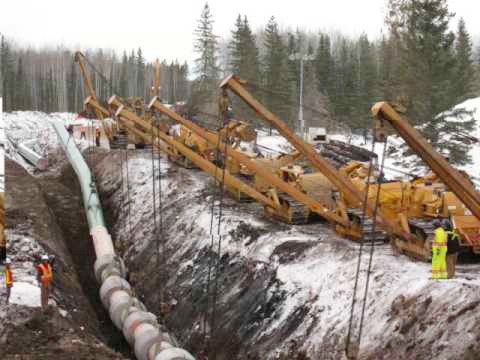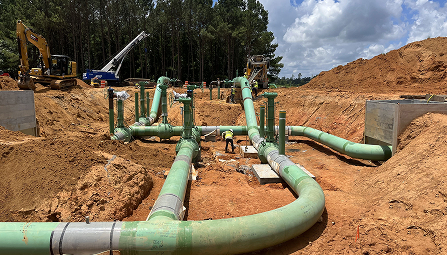The Essential Guide to Comprehending Pipeline Construction Services and Their Significance
Pipeline Construction solutions are fundamental to the transport of necessary sources such as oil, water, and gas. These solutions include precise planning and implementation, sticking to strict security and ecological criteria. As the market adapts to modern-day difficulties, recognizing its ramifications and components becomes progressively essential. What elements add to the growing significance of these solutions in today's economic climate? The adhering to areas will check out these important elements.
Review of Pipeline Construction Solutions
Pipeline Construction solutions incorporate a variety of tasks important for the installation and upkeep of pipes used to transport numerous compounds, consisting of water, oil, and gas. These services are critical for assuring the effective and risk-free activity of sources from one place to one more. The process normally begins with extensive preparation and design, which thinks about governing demands, ecological factors to consider, and logistical obstacles.
Excavation and grading of the land are conducted to prepare the website for Pipeline installment when planning is full. This is followed by the actual laying of the pipes, which entails welding or signing up with sections with each other to produce a constant flow course. After installation, extensive testing is done to assure stability and safety. Maintenance solutions are likewise given to deal with any type of concerns that might occur gradually. Overall, Pipeline Construction solutions play a critical function in supporting facilities for energy and water circulation.
Trick Parts of Pipeline Construction
A successful Pipeline Construction job relies upon several key elements that assure the efficient and risk-free setup of the Pipeline system. First, complete website analyses are essential, as they determine the environmental and geographical aspects that might affect Construction. Next off, the choice of ideal materials, such as fittings and pipelines, is vital for securing durability and compatibility with the delivered compounds.
Furthermore, advanced Construction strategies, consisting of trenchless technology and directional drilling, improve effectiveness and reduce ecological effect. Efficient project administration is one more critical component, working with labor, tools, and timelines to satisfy project objectives.
In addition, interaction amongst stakeholders, consisting of designers, specialists, and neighborhood authorities, guarantees alignment on project specs and demands. Lastly, thorough quality assurance measures throughout the Construction procedure ensure compliance with industry criteria and take full advantage of the Pipeline's operational life expectancy. Jointly, these components form the backbone of an effective Pipeline Construction task.
Security Requirements and Laws in Pipeline Construction

Regulatory bodies, such as the Occupational Security and Health And Wellness Management (OSHA) and the Pipeline and Hazardous Products Security Management (PHMSA), stated particular requirements that control Construction techniques. These include protocols for tools use, employee training, and emergency feedback treatments. By carrying out these criteria, Construction business not just protect their employees but additionally secure public trust fund. Inevitably, extensive safety and security procedures add to the long-term success of Pipeline projects, guaranteeing they fulfill both environmental and functional expectations.
Environmental Factors To Consider in Pipeline Projects

Ecological considerations are important to the preparation and execution of Pipeline projects. These tasks should examine possible effect on ecosystems, water resources, and neighborhood wildlife. Conducting comprehensive environmental influence assessments (EIAs) is essential, permitting stakeholders to determine and mitigate threats prior to Construction begins.
Safeguarding delicate areas, such as environments and wetlands, typically needs implementing details style functions or alternate transmitting to decrease interruption. Furthermore, Pipeline operators are entrusted with establishing methods for preventing leaks and spills, which can have damaging impacts on the atmosphere.
Engagement with local neighborhoods is vital, as public concerns can bring about job modifications that improve ecological security. Compliance with regulations set by environmental firms assures that projects satisfy sustainability standards, promoting a balance in between framework requirements and eco-friendly conservation. Eventually, resolving environmental factors to consider not only safeguards nature yet also promotes neighborhood trust and task viability.
The Function of Innovation in Pipeline Construction
Innovation plays a necessary function in modern Pipeline Construction, enhancing effectiveness and precision. Advanced surveying techniques permit precise planning and implementation, minimizing ecological impact and task hold-ups. Furthermore, the combination of automation and robotics improves procedures, reducing labor prices and enhancing safety on Construction websites.
Advanced Checking Techniques
Advanced evaluating techniques play an essential role in the effective execution of Pipeline Construction tasks. These techniques take advantage of innovative technology to assure precise mapping and evaluation of the terrain where pipes will certainly be set up. Methods such as Geographic Details Systems (GIS), LiDAR (Light Discovery and Ranging), and 3D modeling allow engineers to envision and analyze the landscape, recognizing prospective obstacles and ecological worries. By using these advanced devices, teams can enhance precision ready and placement, greatly lowering the danger of mistakes throughout Construction. Additionally, real-time information collection permits instant adjustments and educated decision-making throughout the project lifecycle. Inevitably, these evaluating advancements contribute to enhanced effectiveness, safety, and sustainability in Pipeline Construction efforts.
Automation and Robotics

Economic Influence of Pipeline Framework
Pipeline facilities plays a vital function in shaping regional economic situations and assisting in trade. By giving a dependable means of delivering oil, gas, and other products, pipes reduce transport costs and boost supply chain efficiency. This facilities draws in investment, promotes work production, and promotes economic growth in surrounding areas.
The Construction and upkeep of pipes contribute significantly to regional economic climates, developing countless employment chances in various industries, from engineering to labor. The increase of jobs frequently results in boosted costs in neighborhood services, even more boosting economic activity.
In addition, pipelines enhance energy protection by making sure a stable supply of resources, which is essential for property requirements and industrial operations. As regions become interconnected with Pipeline networks, they get to more comprehensive markets, enhancing competitiveness and economic durability. Subsequently, the financial influence of Pipeline framework is diverse, influencing both instant local economic climates and more comprehensive local advancement.
Future Patterns in Pipeline Construction Solutions
The future of Pipeline Construction services is advancing in action to technological improvements, regulative adjustments, and growing ecological considerations. Developments such as drones and robotics are improving examination and upkeep procedures, improving security and performance. Automation is poised to lower labor expenses and raise accuracy in Construction procedures. In addition, the raising focus on sustainability is motivating firms to embrace eco-friendly materials and practices, straightening with worldwide initiatives to reduce carbon impacts.
Regulatory structures are likewise adjusting to deal with ecological effects, pressing for better transparency and accountability in Pipeline jobs. Moreover, the assimilation of smart modern technologies, including real-time surveillance systems, click site is expected to enhance the integrity and performance of Pipeline networks. As energy demands shift towards renewable sources, Pipeline Construction services will likely see a rise in projects connected to biofuels and hydrogen transportation. On the whole, these patterns suggest a transformative period for the Pipeline Construction industry, concentrated on advancement and sustainability.
Regularly Asked Inquiries
What Kinds of Pipelines Are Commonly Created?
Different sorts of pipes are generally created, including oil, gas, sewer, and water pipes - Pipeline Construction Services. Each serves distinctive functions, helping with the transportation of essential sources throughout areas while sticking to safety and environmental regulations
For how long Does a Regular Pipeline Project Take?
The duration of a common Pipeline job differs greatly, commonly ranging from a number of months to a couple of years. Aspects affecting this timeline include job intricacy, governing approvals, and ecological considerations that must be resolved.
Who Controls Pipeline Construction Firms?
Pipeline Construction business are managed by various federal, state, and regional agencies, including the Pipeline and Hazardous Materials Safety And Security Administration (PHMSA) find more info and state utility commissions, guaranteeing conformity with safety and security and ecological criteria throughout the Construction process.
What Are Common Products Used in Pipeline Construction?
Typical products used in Pipeline Construction include pvc, polyethylene, and steel. Each product provides distinctive benefits such as longevity, resistance, and versatility to deterioration, making them ideal for various applications in delivering gases and fluids.

Exactly How Are Pipeline Construction Expenses Approximated?
Pipeline Construction costs are estimated by evaluating factors such as material costs, labor rates, job intricacy, environmental factors to consider, and regulative requirements (Pipeline Construction Services). Precise cost estimation warranties reliable budgeting and project planning throughout the Construction process
Pipeline Construction services incorporate a range of tasks vital for the installation and upkeep of pipelines made use of to transport different compounds, consisting of oil, gas, and water. An effective Pipeline Construction task counts on a number of crucial elements that ensure the reliable and safe installation of the Pipeline system. Advanced surveying strategies play an essential role in the effective implementation of Pipeline Construction tasks. Different types of pipes are frequently created, consisting of oil, gas, water, and sewage pipes. Pipeline Construction expenses are approximated by assessing aspects such as product expenditures, labor prices, job complexity, environmental factors to consider, and regulative requirements.